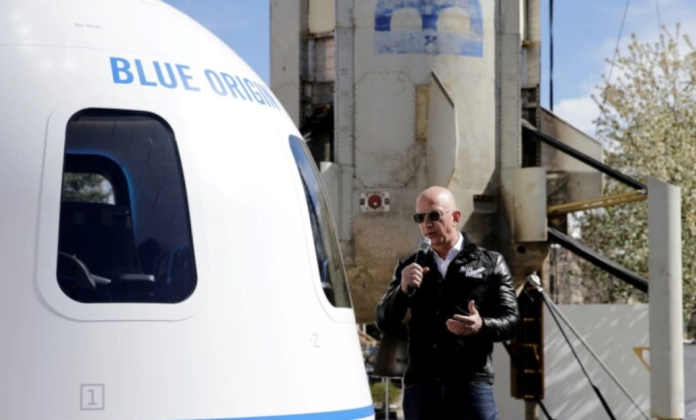If successful, New Glenn will position Blue Origin to successfully compete with SpaceX for launching satellites—and eventually humans—into space.
Former Amazon CEO Jeff Bezos’s commercial space company Blue Origin is set to host the inaugural launch of its massive New Glenn Rocket on Jan. 12 from the Cape Canaveral Space Force Station in Cape Canaveral, Florida.
It will be the rocket’s first launch into orbit, posing one of the largest challenges to fellow billionaire Elon Musk’s SpaceX, which has long dominated the U.S. commercial space industry.
Blue Origin’s New Glenn rocket stands 30 stories high, and the company has made its development a central goal since Bezos launched the aerospace manufacturer in 2000. As a multi-billion dollar project, New Glenn challenges the market hold of SpaceX, the key industry leader in launching both satellites and humans into space with its Falcon 9 and other spacecraft.
If New Glenn proves successful, it will then start launching satellites for Amazon’s broadband internet constellation, Kuiper, which will test the market hold of SpaceX’s Starlink network.
While Blue Origin has for years launched and landed its considerably smaller and reusable New Shepard rocket to the edge of Earth’s atmosphere, the company has yet to reach orbit with any launch vehicle in the 25 years since Bezos founded Blue Origin to allow for “millions of people working and living in space.” New Glenn is operating with new rockets, so it’s not clear if the launch will be a success.
The launch is set for 1 a.m. on Sunday from Blue Origin’s launchpad in Cape Canaveral, and the company will attempt to send its Blue Ring satellite into orbit. Blue Ring is a steerable spacecraft engineered for national security missions and satellite servicing in space.
New Glenn is about twice as powerful as SpaceX’s popular Falcon 9 rocket, and has a payload bay with a diameter two times bigger for larger satellite loads. While Falcon 9 starts at around $62 million, Blue Origin has not yet disclosed the price of launching New Glenn.
SpaceX’s next-generation Starship craft is more powerful than New Glenn. With its fully reusable rocket system that has already successfully returned to the launch pad once during tests, Starship is set for another test flight later this month to try and deploy mock satellites.
Assuming New Glenn proves its flightworthiness, Blue Origin has already booked launch deals with several companies, including Eutelsat’s OneWeb, Canada’s Telesat, and satellite-to-cellular device company AST SpaceMobile.
Minutes after takeoff, New Glenn’s reusable rocket core stage will attempt its first return on a drone ship—a practice now mastered by SpaceX’s Falcon 9 after initial tests returned the core stage to the ocean a decade ago.
Three Blue Origin CEOs have overseen New Glenn’s slow development as the company pursued other projects, including the production of a moon lander for NASA’s Artemis program.
That changed in late 2023, when Bezos sought to accelerate the spacecraft and replaced Blue Origin’s CEO with Amazon’s Dave Limp.
New Glenn must also compete with United Launch Alliance’s (ULA) less-powerful Vulcan rocket. ULA is a joint venture between Lockheed Martin and Boeing, and it is planning to build a stronger version of Vulcan in the future.
Sunday’s launch is also New Glenn’s key certification flight required by the U.S. Space Force before Blue Origin can launch national security payloads. The company hopes to win those missions in a multibillion-dollar procurement competition which will be awarded later this year.






















